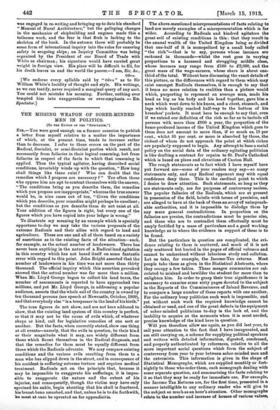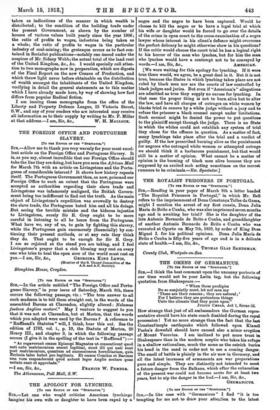THE MISSING WEAPON OF SOBER-MINDED MEN IN POLITICS. [To THE
EDITOR OF THE "SPECTATOR."]
Sin.,—Yon were good enough on a former occasion to publish a letter from myself relative to a matter the importance of which, at the present time, tends to increase rather than to decrease. I refer to those errors on the part of the Radical, Socialist, or semi-Socialist parties which result, not necessarily from fallacies in their logical reasoning, but from fallacies in respect of the facts to which that reasoning is applied. Thus the typical agitator, having described social conditions, invariably winds up with the question, " How long shall things like these exist ? Who can doubt that the remedies which I propose are necessary ? " Too often those who oppose him are apt to content themselves with the answer, " The conditions being as you describe them, the remedies which you propose are inappropriate," whereas the true answer would be, in nine cases out of ten, " Given the conditions which you describe, your remedies might perhaps be excellent ; but the conditions as you describe them do not exist at all. Your addition of the figures is right, but every one of the Sgures which you have copied into your ledger is wrong."
To illustrate my meaning by an example which is specially opportune to-day we may take the various proposals of the extreme Radicals and their allies with regard to land and agriculture. These are one and all of them based on a variety of assertions as to the existing facts of the situation—such, for example, as the actual number of landowners. There has never been anything in the nature of a Radical land agitation in this country which has not based itself on some fantastic error with regard to this point. John Bright asserted that the number of landowners in his time was not more than thirty thousand. The official inquiry which this assertion provoked showed that the actual number was far more than a million. When Mr. Lloyd George began to collect his land taxes, the number of assessments is reported to have approached two millions, and yet Mr. Lloyd George, in addressing a popular audience, asserts that the whole soil of the country is owned by ten thousand persons (see speech at Newcastle, October, 1909), and that everybody else "is a trespasser in the land of his birth."
The true figures do not show, and are not here adduced to show, that the existing land system of this country is perfect, or that it may not be the cause of evils which, of whatever shape or kind, call for legislative remedies of one sort or another. But the facts, when correctly stated, show one thing at all events—namely, that the evils in question, be their kind or their magnitude what it may, are widely different from those which flaunt themselves in the Radical diagnosis, and that the remedies for them must be equally different from those which the Radicals advocate. We may compare existing conditions and the various evils resulting from them to a man who has slipped down in the street, and in consequence of his accident is suffering extreme torture and requires medical treatment. Radicals act on the principle that, because it may be impossible to exaggerate his sufferings, it is impos- sible to exaggerate the nature and the extent of his injuries, and consequently, though the victim may have only sprained his ankle, begin shouting that his skull is fractured, his breast-bone smashed, and that, unless he is to die forthwith, he must at once be operated on for appendicitis. The above-mentioned misrepresentations of facts relating to land are merely examples of a misrepresentation which is far wider. According to Radicals and kindred agitators the great evil of existing conditions is this : that they result in the annual wealth of the United Kingdom being so divided that one-half of it is monopolized by a small body called "the rich"—that is to say, persons whose incomes are reckoned in thousands—whilst the rest goes in varying proportions to a harassed and struggling middle class, whose incomes may range from £160 to £2,000, and the great mass of the wage-earners, whose share is about one- third of the total. Without here discussing the exact details of this picture, or the differences with regard to them which may exist amongst Radicals themselves, it is enough to say that it bears no more relation to realities than a picture would which, purporting to represent an average man, made his head as big as his body and his head together, gave him a neck which went down to his knees, and a chest, stomach, and legs which hardly reached half-way to the bottom of his breeches' pockets. It must here be enough to say that, even if we extend our definition of the rich so far as to include all persons with more than £800 a year, the proportion of the home-produced income of the United Kingdom which goes to them does not amount to more than, if so much as, 15 per cent., whilst 85 per cent. or more is absorbed by those, the richest of whom do not approach the point at which riches are popularly supposed to begin. Any attempt to base a social policy on the social data of the ordinary agitating politician is like drafting a contract for repairs to St. Paul's Cathedral which is based on plans and elevations of Caxton Hall.
The rough statements as to fact which I have myself here put forward are—some of your readers may say—so many statements only, and any Radical opponent may with equal confidence deny them. This is the cardinal point to which I desire to draw attention. Such statements, so long as they are statements only, are for purposes of controversy useless. The popular fallacies of the Radicals, which are at present in possession of the field, bristle with terms of precision, and are alleged to have at the back of them an array of unimpeach- able authorities, and it is impossible to dislodge them by any mere general contradictions. In proportion as the fallacies are precise, the contradictions must be precise also, and those who are to contradict them effectually must be amply fortified by a mass of particulars and a good working knowledge as to where the evidence in support of these is to be found.
But the particulars in question are complicated, the evi- dence relating to them is scattered, and much of it is not only scattered but buried in the pages of official volumes and cannot be understood without laborious study and collation. Let us take, for example, the Income-Tax returns. Most people take these as given in the Statistical Abstracts, where they occupy a few tables. These meagre summaries are cal- culated to mislead and bewilder the student far more than to enlighten him. In order to grasp their true significance it is necessary to examine some sixty pages devoted to the subject in the Reports of the Commissioners of Inland Revenue, and to compare a large number of these reports with one another. For the ordinary busy politician such work is impossible, and yet without such work the required knowledge cannot be obtained or used, and one of the great defects in the equipment of sober-minded politicians to-day is the lack of, and the inability to acquire at the moments when it is most needed, precise knowledge of the kind here in question.
Will you therefore allow me again, as you did last year, to call your attention to the fact that I have inaugurated, and am still carrying on, a scheme for supplying political speakers and writers with detailed information, digested, condensed, and properly authenticated by references, relative to all the more important social questions which form the subject of controversy from year to year between sober-minded men and the extremists. This information is given in the shape of Statistical Monographs, which are supplied monthly or fort- nightly to those who order them, each monograph dealing with some separate question, and summarizing the facts relating to it so that they may be ready for immediate use. For example, the Income Tax Returns are, for the first time, presented in a manner intelligible to any ordinary reader who will give to the subject so much as an hour's attention. Other monographs relate to the number and increase of houses of various values, taken as indications of the manner in which wealth is distributed ; to the condition of the building trade under the present Government, as shown by the number of houses of various values built yearly since the year 1906; the ratio of profits to wages, industries being taken as a whole; the ratio of profits to wages in the particular industry of coal-mining; the grotesque errors as to fact con- tained in Socialist publications—notably one issued under the auspices of Mr. Sidney Webb; the actual total of the land rent of the United Kingdom, &c., &c. I would specially call atten- tion to two monographs now in preparation, which are digests of the Final Report on the new Census of Production, and -which throw light never before obtainable on the distribution of wealth amongst the inhabitants of the United Kingdom, verifying in detail the general statements as to this matter which I have already made here, by way of showing how fact differs from popular Radical fiction.
I am issuing these monographs from the office of the Liberty and Property Defence League, 25 Victoria Street, S.W., and any of your readers who are interested may receive all information as to their supply by writing to Mr. F. Millar at that address.—I am, Sir, &c., W. H. MALLocK.















































 Previous page
Previous page